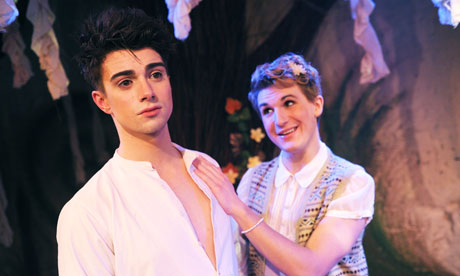
This is the third all-male version of Gilbert and Sullivan that Sasha Regan has directed at this tiny Southwark theatre. But, while the result is as "blithe and gay" as the dairymaid heroine herself, it also leaves me feeling that the single-sex approach blunts the satirical edge of this strange piece.
Writing in 1881, Gilbert was explicitly lampooning Wilde and the apostles of the new aesthetic movement. Bunthorne, the hero, is a preening poseur who discovers you will be acclaimed "if you walk down Piccadilly with a poppy or a lily in your medieval hand", while his amorous rival, Grosvenor, is an even more vainglorious narcissist. But the essential Gilbertian joke is that these effete dandies prove far more sexually attractive than a bunch of butch dragoons do to 20 lovesick maidens – a subversive gag that gets slightly lost if the girls are played by pretty young men in print frocks who look as if they belong to the same club as the aesthetes. Even the hearty soldiers in this production give the impression they have pitched a good deal of camp in their time.
The strength of Regan's production lies in its realisation that Sullivan's tunes cry out to be danced. Drew McOnie's choreography, even in this small space, is wittily inventive so that the song The Magnet and the Churn is niftily illustrated by scissor movements and simulated kettles. Under the musical direction of Richard Bates, who himself nobly sports a dress, the cast also sing extremely well. Dominic Brewer as Bunthorne and Stiofan O'Doherty as Grosvenor both have the crisp articulation that gives full value to Gilbert's lyrics. Edward Charles Bernstone's demure Patience and James Lacey's roguish Lady Angela also lead a male group who maintain a pure falsetto without any visible strain, while returning to a lower register when they augment chorus numbers from the back of the stalls.
It is all very jolly, thanks to Sullivan's irresistible melodies. But I'm still puzzled by the point of Regan's all-male approach. Her Iolanthe, I gather, had some rationale in that the action was set in a boys' public school, but here there is no such context. What is heartening in recent years is that these cherishable operettas have been stripped of the veneer of affectation that disfigured them in the latter days of the D'Oyly Carte company: watching Opera North's superb Ruddigore was like seeing an old canvas handsomely restored. We need, I suggest, to keep removing the barnacled camp from Gilbert and Sullivan rather than, as here, add an extra layer.

